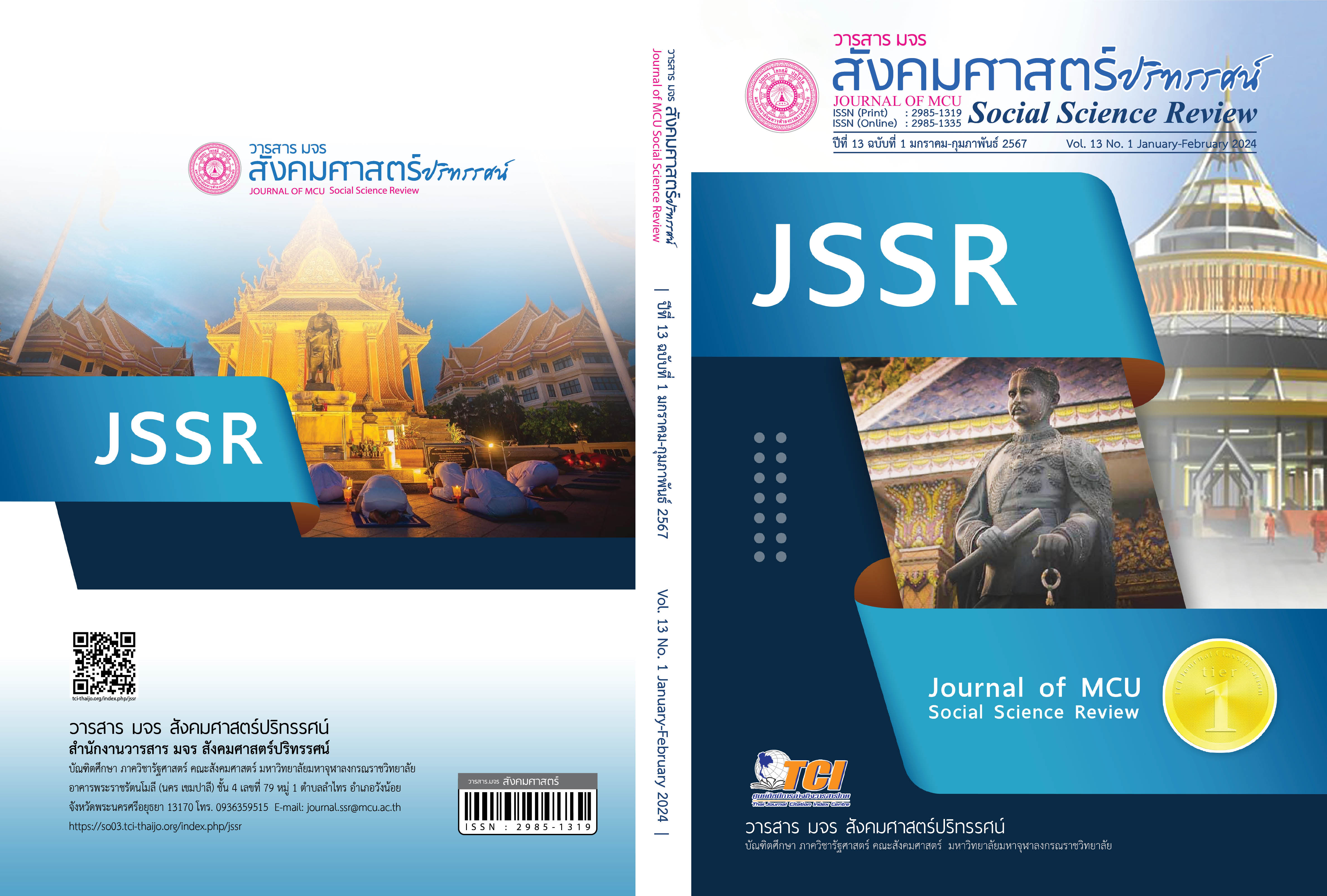การสำรวจความเป็นมาของการบรรเทาความยากจนผ่านการจัดการการท่องเที่ยว โดยใช้เมืองมาลูทัง มณฑลลู่ฉวน ประเทศจีน
คำสำคัญ:
การบรรเทาความยากจนด้านการท่องเที่ยว, นโยบายการท่องเที่ยว, การวางแผนการท่องเที่ยวบทคัดย่อ
บทความวิจัยนี้มีวัตถุประสงค์ 1. วิเคราะห์สถานะปัจจุบันของ นโยบายการท่องเที่ยวในเมือง Malutang ประเทศจีน และ 2. ตรวจสอบสถานะปัจจุบันของการวางแผนการท่องเที่ยวในเมือง Malutang ประเทศจีน โดยเลือกสัมภาษณ์กลุ่มคนที่มีส่วนเกี่ยวข้องในด้านการท่องเที่ยวจำนวน 30 คน ได้แก่ คนจนในพื้นที่ 9 คน ข้าราชการส่วน ท้องถิ่น 6 คน เจ้าหน้าที่องค์กรพัฒนา ของเอกชน 3 คน นักท่องเที่ยว 6 คน และภาคเอกชน 6 คน สำหรับการเก็บ รวบรวมข้อมูลได้ใช้การสัมภาษณ์แบบกึ่งโครงสร้าง
ผลการวิจัยพบว่า 1. ตามนโยบายการบรรเทาความยากจนแบบกำหนดเป้าหมาย ทำให้ผู้ที่อยู่อาศัยในเมือง Malutang กำจัดความยากจนข้นแค้น อย่างไรก็ตาม ประชากรในท้องถิ่นมีระดับ การศึกษาค่อนข้างต่ำ และรัฐบาลท้องถิ่นยังขาดความเชี่ยวชาญในการพัฒนาแหล่ง ท่องเที่ยว ซึ่งอาจส่งผลให้รัฐบาลต้องให้ความสำคัญกับผลประโยชน์ทางเศรษฐกิจ เมื่อสร้างและดำเนินนโยบายการท่องเที่ยว 2. แม้ว่าในปัจจุบันจะไม่มีการท่อง เที่ยวในพื้นที่นี้ ทว่าทรัพยากรธรรมชาติที่อุดมสมบูรณ์และประวัติศาสตร์อันยาวนาน ทำให้พื้นที่นี่เป็นพื้นที่ที่เหมาะแก่การพัฒนาแหล่งท่องเที่ยว อีกทั้งประชากรยังขาดความชำนาญ ผลของการวิจัยนี้ช่วยให้มีความเข้าใจมากขึ้นถึงสถานการณ์ปัจจุบันตลอดจนการขยายการท่องเที่ยวและลดความยากจน
เอกสารอ้างอิง
Ashley, C., et al. (2001). Pro-Poor Tourism Strategies: Making Tourism Work for the Poor - A Review of Experience, Pro-Poor Tourism Report. London: The Russell Press.
Ashley, C., & Roe, D. (2002). Making tourism work for the poor: Strategies and challenges in Southern Africa. Development Southern Africa, 19(1), 61-82.
Christie, I. T. (2002). Tourism, growth and poverty: Framwork conditions for tourism in developing countries. Tourism Review, 57(1/2), 35-41.
Croes, R. (2014). The role of tourism in poverty reduction: An empirical assessment. Tourism Economics, 20(2), 207–226.
Eisenhardt, K. M. & Graebner, M. E. (2007). Theory building from cases: Oppotunities and challenges. Acad. Manag. 1, 25-32.
Manyana, G., & Jones, E. (2007). Community based tourism enterprise development in Kenya: An exploration of their potential as avenus of poverty reduction. Journal of Sustainable Tourism, 26(2), 628-644.
National Tourism Administration, C. (2016). The national observation report on poverty alleviation through rural tourism. China: National Tourism Administration.
Ritchie, J., et al. (2003). Designing and Selecting Samples. In &. J. J. Ritchie, Qualitative Research Practice. (pp. 263-286). London, UK: Sage.
Spenceley, A., & Goodwin, H. (2007). Natural-based tourism and poverty alleviation: Impacts of private sector and parastatal enterprise in and around Kruger National Park South Africa. Current Issues in Tourism, 10(2-3), 255-277.
UNWTO. (2002). Tourism and Poverty Alleviation. UNWTO.
ดาวน์โหลด
เผยแพร่แล้ว
รูปแบบการอ้างอิง
ฉบับ
ประเภทบทความ
สัญญาอนุญาต
ลิขสิทธิ์ (c) 2024 วารสาร มจร สังคมศาสตร์ปริทรรศน์

อนุญาตภายใต้เงื่อนไข Creative Commons Attribution-NonCommercial-NoDerivatives 4.0 International License.
เพื่อให้เป็นไปตามกฎหมายลิขสิทธิ์ ผู้นิพนธ์ทุกท่านต้องลงลายมือชื่อในแบบฟอร์มใบมอบลิขสิทธิ์บทความให้แก่วารสารฯ พร้อมกับบทความต้นฉบับที่ได้แก้ไขครั้งสุดท้าย นอกจากนี้ ผู้นิพนธ์ทุกท่านต้องยืนยันว่าบทความต้นฉบับที่ส่งมาตีพิมพ์นั้น ได้ส่งมาตีพิมพ์เฉพาะในวารสาร มจร สังคมศาสตร์ปริทรรศน์ เพียงแห่งเดียวเท่านั้น หากมีการใช้ภาพหรือตารางหรือเนื้อหาอื่นๆ ของผู้นิพนธ์อื่นที่ปรากฏในสิ่งตีพิมพ์อื่นมาแล้ว ผู้นิพนธ์ต้องขออนุญาตเจ้าของลิขสิทธิ์ก่อน พร้อมทั้งแสดงหนังสือที่ได้รับการยินยอมต่อบรรณาธิการ ก่อนที่บทความจะได้รับการตีพิมพ์ หากไม่เป็นไปตามข้อกำหนดเบื้องต้น ทางวารสารจะถอดบทความของท่านออกโดยไม่มีข้อยกเว้นใดๆ ทั้งสิ้น





